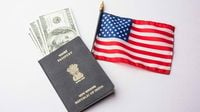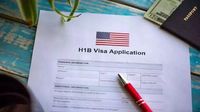New York: A recent ruling from a U.S. district judge has paved the way for the Trump administration to enforce a controversial policy requiring all immigrants in the United States to register with the federal government and carry documentation proving their immigration status at all times. This new rule impacts a broad spectrum of individuals, including Indian nationals on H-1B visas, international students, and green card holders—many of whom are part of the significant Indian diaspora in the U.S.
The Department of Homeland Security (DHS) issued a statement clarifying that all noncitizens aged 18 and older are required to carry proof of their legal status at all times. This directive applies not only to individuals currently registered, such as those holding H-1B visas or green cards, but also to those who entered the U.S. on valid visas. While these individuals will not need to re-register, they must provide documentation when requested by authorities.
The enforcement of this policy follows a ruling by U.S. District Judge Trevor McFadden, who was appointed by former President Donald Trump. Judge McFadden dismissed legal challenges brought by immigrant advocacy groups, stating that they lacked the standing to contest the regulation. He ruled that the plaintiffs, including the Coalition for Humane Immigrant Rights and United Farm Workers of America, had failed to demonstrate that the rule would significantly harm their missions. "As organizations, many of their harms are too speculative, and they have failed to show that the Rule will erode their core missions," Judge McFadden wrote, according to Reuters.
The new regulation also introduces a requirement for immigrant children turning 14 to re-register with the federal government and submit their fingerprints within 30 days of their birthday. This stipulation has heightened anxiety within immigrant communities, particularly among parents who now face additional bureaucratic hurdles.
The DHS emphasized that prioritization of enforcement is crucial for national security and public safety. "All noncitizens 18 and older must carry this documentation at all times. This administration has directed DHS to prioritize enforcement; there will be no sanctuary for noncompliance," the DHS stated in a release on April 11, 2025.
Critics of the policy argue that it unfairly targets immigrants and complicates their lives further. Nicholas Espiritu, deputy legal director at the National Immigration Law Center, described the ruling as "disappointing," warning that it would force individuals into a difficult position: comply with the new registration requirements or face potential deportation. He stated, "This ruling will force people into an impossible choice between registering and risking immediate deportation or refusing and facing penalties."
The implications of this policy are particularly significant for the large number of Indian workers and students in the United States. Many of these individuals are already navigating an increasingly complex and hostile immigration environment. The requirement to carry documentation at all times adds another layer of stress and uncertainty to their lives.
The enforcement of this rule comes amid a broader trend of heightened immigration enforcement under the Trump administration, which has seen a surge in measures aimed at restricting immigration and strengthening border security. Legal experts have expressed concerns that this new policy could lead to increased scrutiny of immigrants and potential violations of their rights.
For those already registered, such as green card holders and individuals with valid visas, the new requirement to carry proof of status at all times is particularly burdensome. They must now ensure they have their documents on hand whenever they leave their homes, as any discrepancies could lead to legal complications.
The DHS has made it clear that there will be no grace period for noncompliance. Failure to carry documentation could result in penalties, including fines up to $5,000, imprisonment for up to 30 days, and possible loss of legal immigration status. The regulation also mandates that foreign nationals update their address with the authorities within ten days of moving.
As of 2022, the DHS estimated that there were approximately 220,000 undocumented Indians in the U.S., highlighting the potential impact of this policy on a significant demographic. Other estimates range from 375,000 (according to the Migration Policy Institute) to as high as 700,000 (per Pew Research Center) undocumented Indians, who now face increased exposure to immigration enforcement.
In summary, the recent court ruling and subsequent DHS directive mark a significant shift in U.S. immigration policy, compelling all immigrants—including those legally residing in the country—to navigate a more stringent regulatory landscape. As this policy takes effect, the immigrant community, particularly those from India, will have to adapt to the new requirements while grappling with the associated challenges and uncertainties.





